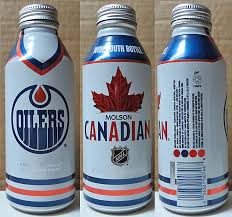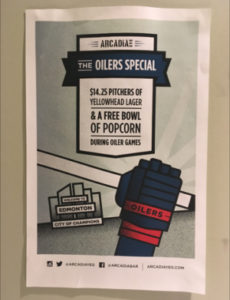Late last week the social media world exploded with news that the Edmonton Oilers had ordered the owner of a small, craft oriented bar in town to stop promoting in-house beer specials during Oiler games (you can read the CBC story here). The bar, Arcadia on 124 Street, is committed to serving only Alberta-made craft beer and has developed a reputation in town as a quality craft beer stop. They seem to regularly have something rare on tap (often due to the owners’ willingness to drive to the brewery to pick up a keg) and their cask nights are legendary. They seem an odd place to single out for legal sabre-rattling.
As we have since learned, Arcadia is not alone in feeling the wrath of the Oilers’ legal team. Other bars have also been warned against promoting the Oilers in their establishments.
The threats come with a carrot – at least in the minds of the Oilers management – in the form of an offer that if the establishment carries Molson products, they would be happy to support them in promoting Oilers games. Hmm. Interesting.
There has been lots of consumer outrage over the weekend about this, so I see no need to pile on. The move is understandably frustrating for fans of craft beer and the Oilers are clearly demonstrating a stunning tone-deafness in this PR fiasco.
Instead I want to look at the bigger picture and bring in some analysis to bear.
The problem here isn’t the Oilers, it is the practice of exclusivity contracts. In Regina their fancy new Mosaic stadium has not yet lost its new car smell yet the odour of crass pandering to Molson reeks. Despite their best efforts, Saskatchewan craft brewers were unable to persuade the Roughriders and the City of Regina to serve local beer at the new facility (read here for background). Across the continent stadiums and arenas are seas of monoculture beer, either of the Molson or the AB-Inbev variety. That beer fans point to Boston, Atlanta or Denver where local craft beer is served onsite proves how rare such diversity occurs. I remember once being thrilled at the Brier that Great Western Brewing, rather than Molson, had exclusivity rights (read here), it is that barren.
And it is not just sports. Most music festivals, including my beloved Edmonton Folk Music Festival, offer exclusive pouring rights, in this case often to Big Rock. It is common practice for festivals and events to arrange for exclusivity.
The advantage to the organization/sports team is obvious. Money. In the Oilers’ case Molson is prepared to pay a premium to keep out its competitors. For festivals and the like, the sponsorship money is an essential revenue stream.
For the brewery, the advantage is even more obvious. You get a captured market and oodles of space to promote your brands. Plus your competitors can’t even show their face.
The downside for the consumers is also obvious – lack of choice. But for today, that is not the issue I want to focus on.
 The downside for the organization, be it a hockey team or a music festival, is that it shifts their perspective. Unintentionally, the organization becomes an advocate for their brewery partner rather than an advocate for their customers. The Oilers brouhaha demonstrates this shift. The Oilers are actively encouraging bars to sell Molson products (to be eligible for the gravy train that is Oilers promotions). They have become a secondary sales force for one of the largest breweries in the world.
The downside for the organization, be it a hockey team or a music festival, is that it shifts their perspective. Unintentionally, the organization becomes an advocate for their brewery partner rather than an advocate for their customers. The Oilers brouhaha demonstrates this shift. The Oilers are actively encouraging bars to sell Molson products (to be eligible for the gravy train that is Oilers promotions). They have become a secondary sales force for one of the largest breweries in the world.
Festivals rarely go that far, but they regularly heap praise on their brewery partner, while offering silence for anyone else.
Allowing exclusivity sets in motion a certain logic that prioritizes the contracted brewery over fans/consumers/attendees.The interests of the brewery become intertwined with the team/organization. Even the term “partner” is telling. Partners are equals who share in the benefits and consequences of the endeavour. That is not what this is. Molson is selling beer at a hockey game. That doesn’t make them a “partner”. That makes them a supplier. And suppliers should be exposed to the cut and thrust of competition, not shielded in perpetuity because they pulled up to the back door with a Brinks truck.
Exclusivity elevates a supplier to a partner. And thus the logic shifts and we see last week’s farce where a professional hockey club is threatening a small, independent pub run by one guy (literally).
It is not the money that is the problem; there are ways of getting similar revenues in a non-exclusive environment. It is the logic that proves so difficult to overcome. Sports teams, festivals and the like need to stop seeing breweries as partners and start seeing them as beer suppliers.
But I won’t hold my breath.



October 10, 2017 at 9:39 AM
Thoughtful and rational analysis. thanks
October 10, 2017 at 10:53 AM
Sigh….remember this ? https://beta.theglobeandmail.com/news/national/olympia-pizza-ordered-to-scrap-logo/article18275803/?ref=http://www.theglobeandmail.com&